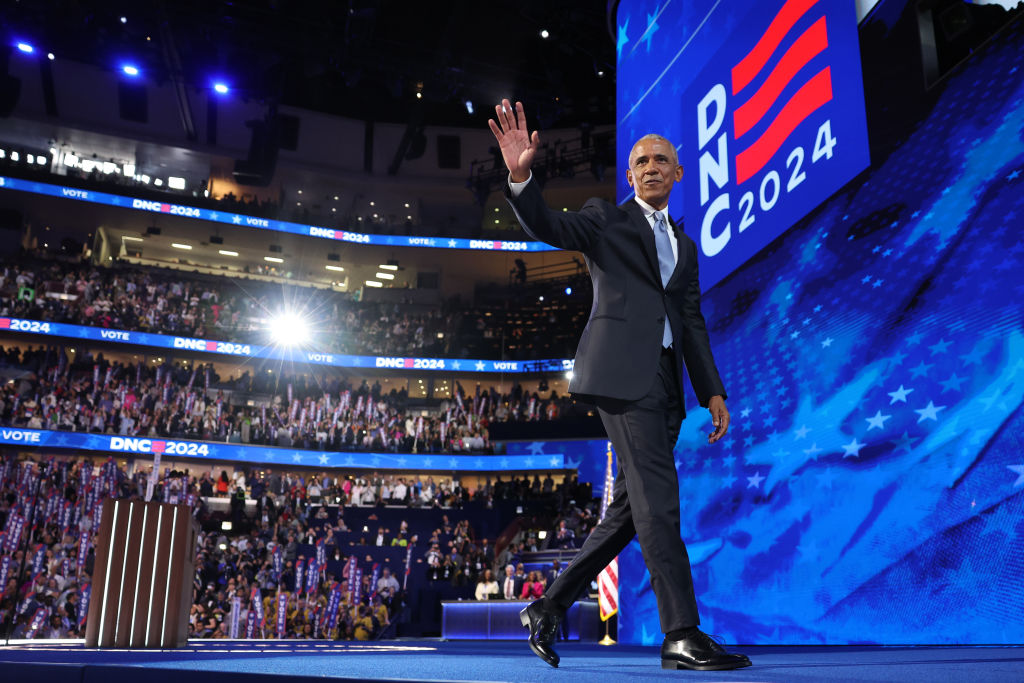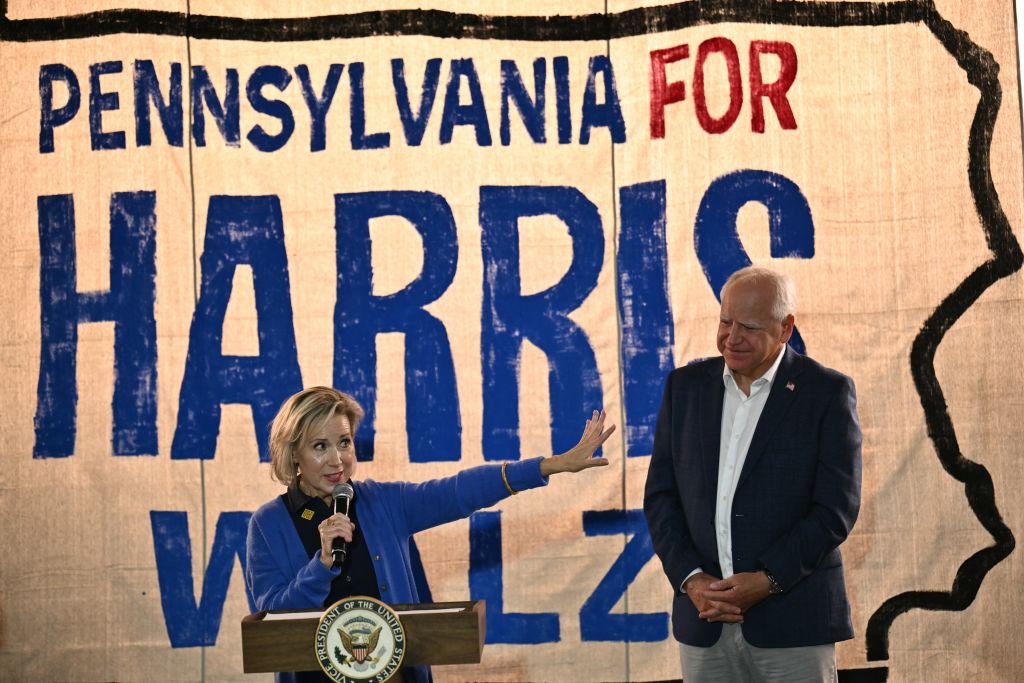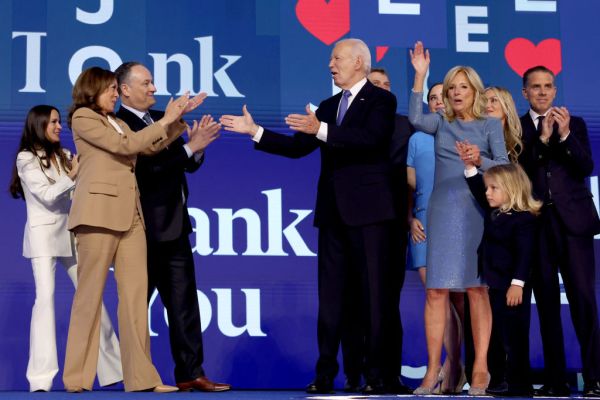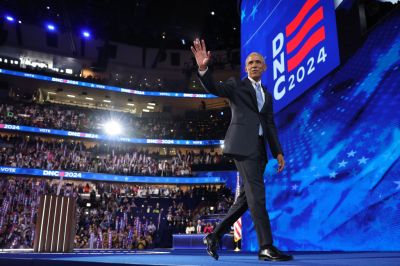Happy Wednesday! Mike was somehow able to find time to review Chicago’s famous Italian beef sandwich. This is slowly becoming a food newsletter.
Up to Speed (Convention Edition)
- Donald Trump’s campaign hosted a news conference in Chicago on Tuesday featuring Rep. Byron Donalds, in which the Florida Republican argued Vice President Kamala Harris is an unreliable crime fighter who sides with criminals over law enforcement. Federal statistics show crime rates that spiked during the coronavirus pandemic continue to drop, which Democrats are promoting to show progress on public safety, a top voter priority. “But crime is only down,” Donalds claimed, “from the horrifically high levels under the Joe Biden, Kamala Harris administration.” The congressman added: “Crime rates are massively up” compared to conditions during the Trump administration. (The data appears inconclusive.)
- Pennsylvania Gov. Josh Shapiro indicated Tuesday that Harris made the right call when she dropped her opposition to fracking, at least as a political matter in the Keystone State, where she is in a dogfight with Trump for the commonwealth’s crucial 19 Electoral College votes. “I welcome the vice president’s position,” Shapiro told reporters during a short news conference, responding to a question from Dispatch Politics. Fossil fuels exploration and development is a major job creator in Pennsylvania, and Shapiro said he supports both those industries and green energy, as will Harris, he predicted, should she win in November. “I’m an all-of-the-above energy governor, and the vice president’s made clear she will be an all-of-the-above president,” he said. “It is critically important to put people to work, to protect our planet, and we are showing in Pennsylvania that you can do both.” Shapiro, a finalist to be selected Harris’ running mate, was scheduled to address the Democratic National Convention on Wednesday evening.
- After a bunch of logistical problems on the convention’s first night, second-night operations were much smoother. Your Dispatch Politics reporters mostly had a much easier time entering the venue. Navigating the floor to talk to delegates was still not all that easy, however.
- Although delegates had confirmed Harris as the Democratic nominee earlier this month in a virtual vote, they conducted a ceremonial roll call on the floor of the convention Tuesday night complete with light-up wristbands and curated tunes. When convention secretary Jason Rae called each state, a DJ would play the accompaniment of a song from an artist related to it: “Lose Yourself” by Eminem for Michigan and “Mr. Brightside” by The Killers for Nevada.
- Is there any room for pro-life people in today’s Democratic Party? The leadership of Democrats for Life doesn’t feel that there is. Check out Charles’ report on a Monday panel from the group that featured former Rep. Dan Lipinski, an Illinois pro-life Democrat who served eight terms in Congress before he lost a primary in 2020 to a challenger with the backing of pro-abortion groups.
Up to Speed (Beyond Chicago)
- Nicole Shanahan, running mate to independent presidential candidate Robert F. Kennedy Jr., indicated the campaign was contemplating joining forces with Trump to prevent Harris from winning. She said on Tom Bilyeu’s Impact Theory podcast that the ticket was weighing whether to stay in the race and risk drawing away votes from Trump, helping Harris, or to “walk away right now and join forces with Donald Trump.” After the episode aired Tuesday, Kennedy posted on X that he is always “willing to talk with leaders of any political party to further the goals I have served for 40 years in my career and in this campaign.”
- Harris’ campaign has raised $500 million since she jumped into the race late last month, Reuters reported Tuesday. The campaign previously said it took in $310 million in July, including $200 million in the first week after she entered the race following President Joe Biden’s July 21 withdrawal. House Democrats are also raking in money, bringing their cash on hand to nearly $92 million after they took in close to $17.6 million in July.
- Meanwhile, Trump raised $47.5 million in July, while spending $24.3 million and bringing his cash-on-hand total to $151.3 million, while Harris reported close to $220 million on hand.
Obama Tries to Paint Harris as an Independent Agent

CHICAGO—On Tuesday night, former President Barack Obama sought to reframe the 2024 presidential contest as a choice between change and more of the same.
Former President Donald Trump is a “guy whose act has—let’s face it—gotten pretty stale,” Obama told the Democratic National Convention crowd and tens of millions of Americans watching at home. “We do not need four more years of bluster and bumbling and chaos. We have seen that movie before, and we all know that the sequel is usually worse.
“America’s ready for a new chapter. America’s ready for a better story. We are ready for a President Kamala Harris,” Obama continued.
Hope and change versus more of the same was a message that served Obama well when he launched his 2008 presidential bid. Back then, the message was as obvious as it was effective for a man seeking to become the first African American president while both preventing a Clinton restoration and bringing an end to eight years of Republican control of the White House. Deploying it on behalf of Kamala Harris in 2024 was nothing short of audacious.
Harris is, after all, the incumbent vice president. If she prevails, Barack Obama, his vice president, and his vice president’s vice president will have won four of the last five presidential elections. And she’s supposed to be the agent of change?
The message might seem absurd in 2024—if Republicans had nominated anyone other than the previous Republican president. But it just might work when deployed against Trump.
Obama used his speech to conjure up feelings of Trump fatigue. He referred to the 2024 Republican presidential nominee as a “78-year-old billionaire who has not stopped whining about his problems since he rode down his golden escalator nine years ago.” He reminded the audience of the “constant stream of gripes and grievances that’s actually been getting worse now that he is afraid of losing to Kamala. There’s the childish nicknames, the crazy conspiracy theories, this weird obsession with crowd sizes.” (At this point, Obama made a hand gesture shrinking the space between his hands in a way that many interpreted as a reference to male anatomy.)
“It just goes on and on and on,” Obama continued. “The other day, I heard someone compare Trump to the neighbor who keeps running his leaf blower outside your window every minute of every day. Now, from a neighbor, that’s exhausting. From a president, it’s just dangerous.”
After tearing Trump down, he sought to build Kamala Harris up by portraying her as an independent capable of bringing about new reforms. “After the home mortgage crisis, she pushed me and my administration hard to make sure homeowners got a fair settlement,” Obama said. “It didn’t matter that I was a Democrat, didn’t matter that she had knocked on doors for my campaign in Iowa—she was going to fight to get as much relief as possible for the families who deserved it.” Obama promised that Harris would take on big banks and for-profit colleges, cut taxes for families, and bring down the cost of health care and housing.
“We can’t just rely on the ideas of the past. We need to chart a new way forward to meet the challenges of today,” Obama said. “And Kamala understands this. She knows, for example, that if we want to make it easier for more young people to buy a home, we need to build more units and clear away some of the outdated laws and regulations that made it harder to build homes for working people in this country. That is a priority. And she’s put out a bold new plan to do just that.”
In short, Obama promised that a “Harris-Walz administration can help us move past some of the tired, old debates that keep stifling progress.”
Tim Walz’s Truth Problem

When the governor of Minnesota takes the stage at the United Center tonight to formally accept his nomination for vice president, Tim Walz will have a chance to present to America his folksy brand of Midwestern progressivism. But while the former congressman and high school teacher will have some license to promise big things to the adoring Democrats in his role as Kamala Harris’ cheerleader in chief, Walz also has a growing number of exaggerations and misrepresentations of his own life that he has yet to give a full accounting for.
The latest example comes from how Walz has characterized the fertility treatment he and his wife, Gwen, used to conceive their two children. Since joining the Democratic ticket, Walz and the campaign have referred to in vitro fertilization (IVF)—both in suggesting it was the fertility treatment he and his wife used, and also by declaring that Republican vice presidential nominee Sen. J.D. Vance is seeking to limit or ban the practice of IVF.
In an April campaign fundraising letter, Walz wrote: “My wife and I used I.V.F. to start a family.” In a July interview with the progressive podcast Pod Save America, Walz said of Vance, “If it were up to him, I wouldn’t have a family, because of IVF, and the things that we need to do reproductively.” The Harris campaign promoted that clip on August 9.
But neither claim is true. According to a report this week from the New York Times, the Harris campaign is now acknowledging that the Walzes used a procedure called intrauterine insemination (IUI), rather than IVF, to conceive their children. While IVF requires the creation of a fertilized embryo in a lab, IUI instead uses a catheter to artificially inseminate a woman with concentrated sperm. Both procedures are among the options that aspiring parents can use legally in the United States to get pregnant. Although some pro-life activists have pushed for laws preventing the intentional or negligent destruction of viable embryos created via IVF, there are no efforts to restrict IUI or other fertility treatments that do not create an embryo outside the womb.
“Governor Walz talks how normal people talk,” said Mia Ehrenberg, a spokesperson for the Harris-Walz campaign, in explaining the governor’s characterization of his wife’s treatment. “He was using commonly understood shorthand for fertility treatments.”
Further, Vance has not said he supports bans or limitations on either IVF or IUI treatments. While the Harris campaign has used Vance’s vote earlier this year against moving forward on a bill titled the Right to IVF Act, to claim he opposes IVF, there’s no evidence the Ohio Republican actually supports banning the procedure.
Nearly every Republican senator voted against the Right to IVF Act, which would have established an individual right to IVF and other fertility assistance procedures while also mandating federal funding. While several Republicans were pushing for an alternative bill they claimed would also protect the practice but with additional protections for unused embryos, Democrats blocked that bill. Vance, along with all of his fellow Republican senators, issued a joint statement in June declaring they “strongly support continued nationwide access to IVF.” And in a February interview with an Ohio TV station, Vance declared that he was for “as much access to fertility treatment as possible.”
When asked to explain when Vance had said he supported a ban on IVF, the Harris campaign pointed to statements from the Ohio Republican’s 2022 Senate campaign when he said, “from the moment of conception, we should be protecting the life of the unborn.”
Walz has frequently referred to the issue of protecting access to IVF as “personal” for him and his family. His home-state paper, the Minnesota Star Tribune, published a story earlier this year on the Walz family’s “IVF journey,” and other news outlets have linked Walz with the fertility treatment. Walz himself has said plenty to give this impression, from his Pod Save America appearance to his first speech after being named Harris’ running mate.
“In Minnesota, we respect our neighbors and their personal choices that they make. Even if we wouldn’t make the same choice for ourselves, there’s a golden rule. Mind your own damn business,” he said in Philadelphia on August 6. “Look, that includes IVF. And this gets personal for me and my family.”
And after an Alabama Supreme Court ruling earlier this year that held a fertility clinic could be held liable for the negligent destruction of embryos, Walz posted on Facebook that “Gwen and I have two beautiful children because of reproductive health care like IVF. This issue is deeply personal to our family and so many others.” Alabama has since passed a law to provide blanket immunity to fertility clinics.
The vagueness of Walz’s own statements have created the false impression that he and his wife would not have been able to have children under laws restricting IVF—and that Republicans support policies that would have prevented the couple from having kids.
It’s hardly the first muddled story about his past that Walz has faced since he became the Democratic nominee for vice president. Questions about how he and others have characterized his military service arose after Republicans and news outlets highlighted statements from Walz that seemed to suggest he served in a combat zone during the Afghanistan war. Walz, a 24-year veteran of the Army National Guard, never served in a combat zone, but his unit was deployed to Italy in 2003 in support of Operation Enduring Freedom, the military’s name for its operation in Afghanistan.
Yet in 2018, while discussing his support for gun control, Walz claimed he carried “weapons of war” in war, about which the Harris campaign has since said Walz “misspoke.” There were other instances over the course of his political career where others described his service as including deployment in Afghanistan, yet Walz did nothing at the time to correct the mischaracterization and at times even promoted the false narrative.
But after Vance, who served in a combat zone in Iraq as a Marine, began criticizing Walz for allowing this description of his service to persist, the Minnesota Democrat defended his service in the military and said people should “never denigrate another person’s service record.”
Meanwhile, a recent report from CNN details how Walz, during his first campaign for Congress in 2006, misrepresented a 1995 DUI arrest. From the report:
According to court and police records connected to the incident, Walz admitted in court that he had been drinking when he was pulled over for driving 96 mph in a 55 mph zone in Nebraska. Walz was then transported by a state trooper to a local hospital for a blood test, showing he had a blood alcohol level of .128, well above the state’s legal limit of 0.1 at the time.
But in 2006, his campaign repeatedly told the press that he had not been drinking that night, claiming that his failed field sobriety test was due to a misunderstanding related to hearing loss from his time in the National Guard. The campaign also claimed that Walz was allowed to drive himself to jail that night.
Notable and Quotable
“Saying something at a rally is not public policy. … Sometimes the president, you know, he jokes.”
—Rep. Byron Donalds of Florida, addressing a reporter’s question about Donald Trump saying in the past he would be willing to deploy U.S. military troops to American cities to combat crime if reelected president this fall, August 20, 2024.









Please note that we at The Dispatch hold ourselves, our work, and our commenters to a higher standard than other places on the internet. We welcome comments that foster genuine debate or discussion—including comments critical of us or our work—but responses that include ad hominem attacks on fellow Dispatch members or are intended to stoke fear and anger may be moderated.
With your membership, you only have the ability to comment on The Morning Dispatch articles. Consider upgrading to join the conversation everywhere.